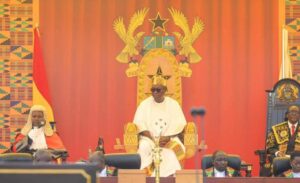Prof. Patrick Asuming Urges President Mahama to Retain Betting Tax for its Moral Impact.
 Renowned Ghanaian economist, Professor Patrick Asuming, has advised President John Dramani Mahama to retain the betting tax due to its positive moral impact on society, despite the president’s pledge to abolish certain taxes if re-elected.
Renowned Ghanaian economist, Professor Patrick Asuming, has advised President John Dramani Mahama to retain the betting tax due to its positive moral impact on society, despite the president’s pledge to abolish certain taxes if re-elected.
Speaking to the media, Prof. Asuming argued that while scrapping nuisance taxes such as the E-levy and the COVID levy is a commendable move, the betting tax serves a broader purpose beyond revenue generation.
Prof. Asuming emphasized that taxation should not only focus on revenue collection but also be used as a policy tool to shape social behavior. He pointed out the growing trend of betting among Ghanaian youth and highlighted the need for measures to discourage excessive gambling.
“One of the problems we have in this country is that we’ve made taxation solely focused on revenue generation, but we forget that we use tax policy to support certain local industries and sectors and to shape behavior. I think the rate at which betting is taking hold of our youth requires some action,” he said.
He acknowledged that retaining the betting tax might not sit well with younger Ghanaians but stressed its long-term societal benefits.
According to Prof. Asuming, the combined revenue from the E-levy, COVID levy, and betting tax accounts for just about 5% of Ghana’s projected revenue for 2025. He stated that removing the E-levy and COVID levy would have minimal financial impact, given their low contribution and widespread unpopularity.
However, he argued that the betting tax should remain in place, as it serves an important regulatory function by curbing excessive betting among young people.
President Mahama, during his 2024 election campaign, pledged to abolish the E-levy, COVID levy, and betting tax as part of efforts to ease the tax burden on Ghanaians. These taxes have faced significant public backlash, with critics labeling them as nuisance taxes that do little to address the country’s fiscal challenges.
Prof. Asuming’s comments have sparked mixed reactions. While some agree with his stance on the betting tax, others believe the promise to abolish the tax reflects the president’s commitment to easing financial pressures on citizens, especially the youth.
Supporters of the betting tax argue that it discourages excessive gambling, which has been linked to addiction and financial instability among young people. Opponents, however, view it as a punitive measure that unfairly targets a popular pastime.
As Ghana navigates its economic challenges, the debate over which taxes to retain or abolish remains central to shaping the country’s fiscal policy. While President Mahama’s proposal to scrap nuisance taxes is widely welcomed, Prof. Asuming’s call to retain the betting tax highlights the need for a balanced approach that considers both economic and social factors.
Whether the betting tax will remain in place or be abolished under Mahama’s administration will ultimately depend on the government’s priorities and its commitment to addressing both fiscal needs and societal concerns.
